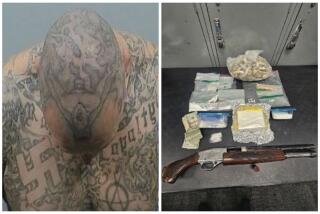19 Charged in Alleged Drug Ring
SAN FRANCISCO — Federal authorities released indictments Thursday charging 19 people with running a $5-million international drug ring that used three medical marijuana dispensaries here as a front.
In San Francisco, where dozens of cannabis clubs have thrived since California legalized the drug as medicine, officials declared that the busts would not undermine the city’s role as a haven for medical marijuana users.
The indictments came as the result of a two-year investigation by U.S. drug agents into a network that allegedly cultivated at least 17,000 marijuana plants, trafficked in Ecstasy and engaged in money laundering and international bulk cash smuggling.
“We’re not talking about ill people using marijuana,” said Kevin Ryan, the U.S. attorney in San Francisco. “We’re talking about a widespread criminal enterprise.”
But medical marijuana advocates said it remained unclear whether the bust was the start of a renewed campaign by U.S. drug agents against pot dispensaries.
“I hope it’s an anomaly,” said Allen St. Pierre, executive director of the National Organization for the Reform of Marijuana Laws.
At the very least, “this is certainly a sign that the DEA is watching people who use medical marijuana,” said Bruce Mirken, a Marijuana Policy Project spokesman.
Javier Pena, the U.S. Drug Enforcement Administration’s special agent in charge of the San Francisco office, declined to link the bust to a renewed campaign against dispensaries.
He said, however, that a message had been sent to purveyors of medicinal pot.
“Some of us in the public think they can disregard the courts and Congress on this matter,” Pena said. “The DEA will not be among them.”
San Francisco has struggled in recent months to rein in a proliferating collection of storefront medicinal pot dispensaries, which number about 35. Some local leaders, though supportive of cannabis patients, have called for a reduction to as few as eight clubs.
But Thursday, city leaders talked of San Francisco remaining a bulwark of support for California’s medical marijuana law, which directly conflicts with U.S. statutes prohibiting cannabis use for any purpose.
Matt Dorsey, a spokesman for the city attorney, told a crowd of 75 patients and pot activists on the steps of City Hall that medical marijuana remained legal in the state. San Francisco officials, he said, “absolutely respect” the rights of the ill to engage in “the compassionate use of cannabis.”
In the indictments released Thursday, three people were charged with possession with intent to distribute Ecstasy, and two others were charged with intent to commit money laundering. An arrest warrant was issued for another man in connection with the case.
Each count of conspiracy to cultivate marijuana carries a mandatory minimum sentence of 10 years in prison, while conspiring to distribute Ecstasy can bring up to 20 years.
A money-laundering conviction can result in 20 years along with a $500,000 fine, authorities said.
The three cannabis clubs involved in the raid, authorities said, were a key part of the ring.
A criminal complaint filed in the case contains alleged statements made to an undercover drug officer by Enrique Chan, owner of one dispensary targeted in the bust.
Chan estimated to agent Pena that only about half the patients had legitimate medical need.
To wrest free of legal squabbles, according to the affidavit, Chan said he hired several criminal defense attorneys, including famed drug lawyer Tony Serra and former San Francisco Dist. Atty. Terrence Hallinan.
“If I get busted for weed here, I’ll take these patients to court,” he allegedly said. “If it comes down to a battle in court, what are you gonna do? You’re going to bring patients in court, like really sick patients with cancer, have them sit on the stand for you. And no jury is gonna ... convict you.”
Glionna reported from San Francisco and Bailey from Sacramento.
More to Read
Sign up for Essential California
The most important California stories and recommendations in your inbox every morning.
You may occasionally receive promotional content from the Los Angeles Times.











